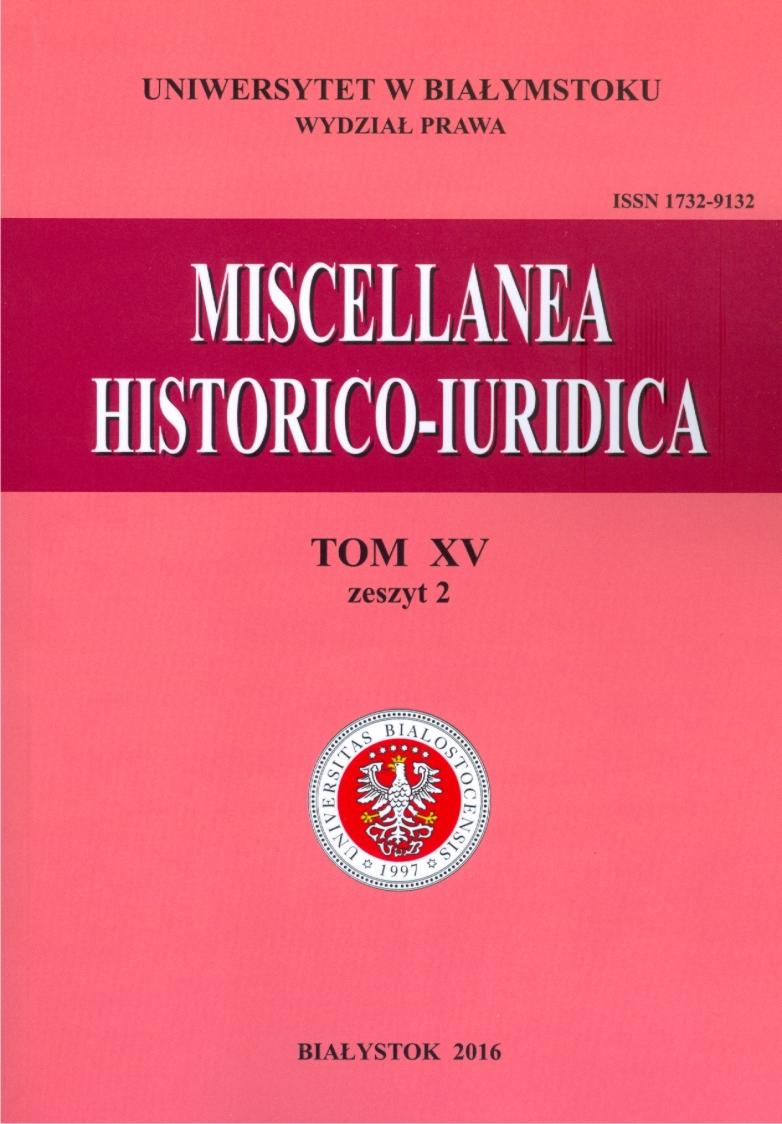Idea godności człowieka w amerykańskiej kulturze i doktrynie prawnej
Słowa kluczowe:
godność ludzka, abolicjonizm, ruch sufrażystek, ruch na rzecz praw obywatelskich, Martin Luther King, Frederick Douglass, Stany Zjednoczone Ameryki, Sąd Najwyższy, niewolnictwo, segregacja rasowa, dyskryminacja kobietAbstrakt
Neither in the Constitution of the United States nor in the later enacted Bill of Rights, does the term “human dignity” occur. Therefore the thesis that was established in the early 90s of the 20th century by Ronald Dworkin and William J. Brennan Jr. may come as a surprise. Both of them – an eminent philosopher of law and a judge of the Supreme Court, recognized human dignity as a fundamental value declared by the American constitution and its complementary Bill of Rights. After closer recognition with American legal culture, this thesis no longer raises such controversies. Despite the fact that the Founding Fathers of the United States did not care so much about dignity as they did about other values, this idea nevertheless appeared in their publications and personal letters. Moreover, in the first Supreme Court ruling on Chisholm v. Georgia, the state, as a product of the human being and its importance, took the view that the right to human dignity was innate. Of course, the American doctrine and its legal culture have been evolving for two hundred years, changing under the influence of a number of important social phenomena. As key topics for the article the following are recognized: abolitionism and the fight against slavery, the suffrage movement and the struggle for women’s rights and the civil rights movement and the fight against racial segregation. All of them undoubtedly have impacted the American idea of dignity, and they certainly have played a significant role in the changes that have occurred over the years in the United States. In European legal culture dignity similarly plays a crucial role, both in individual countries as well as at su- pranational level. Analysis of the place of dignity in American legal culture will provide material that can be compared with its European heritage.
Bibliografia
Berlin I., Pokolenia w niewoli, Warszawa 2010.
Cady Stanton E., Anthony S.B., Gage M.J., History of Women Suffrage, Rochester – London – Paris 1889, online: http://www.gutenberg.org/files/28020/28020-h/28020-h.htm (dostęp: 25.04.2015).
Ciechomska M., Od matriarchatu do feminizmu, Poznań 1996.
Declaration of Sentiment, [w:] Declarations of Freedom and Human Dignity, Millis 1997.
Douglass F., My Bondage and My Freedom, Chicago 1970.
Douglass F., Narrative of the Life of Frederick Douglass. An American Slave, Boston 1845.
Douglass F., Prejudice Against Color, [w:] The Life and Writings of Frederick Douglass, red. Ph. Foner, t. 2, New York 1975.
Encyklopedia popularna PWN, t. 1, Warszawa 1997.
Encyklopedia popularna PWN, t. 9, Warszawa 1998.
Hannam J., Feminizm, Poznań 2010.
King M.L., Dlaczego nie możemy czekać, Warszawa 1967.
King M.L., Strategia non-violence a sprawiedliwość rasowa, [w:] M.L. King, „I have dream”. Słowa zburzyły mur, Warszawa 2014.
King M.L., Miłujcie nieprzyjaciół waszych, [w:] M.L. King, „I have dream”. Słowa zburzyły mur, Warszawa 2014.
King M.L., Przemowa w trakcie Wielkiego Marszu w Detroit, [w:] M.L. King, „I have dream”. Słowa zburzyły mur, Warszawa 2014.
King M.L., Mam marzenie, [w:] M.L. King, „I have dream”. Słowa zburzyły mur, Warszawa 2014.
King M.L., Przemówienie z okazji otrzymania Nagrody Nobla, [w:] M.L. King, „I have dream”. Słowa zburzyły mur, Warszawa 2014.
King M.L., Nasz Bóg jest w drodze do nas, [w:] M.L. King, „I have dream”. Słowa zburzyły mur, Warszawa 2014.
King M. L., Realistyczne spojrzenie na kwestię postępu w obszarze relacji rasowych, [w:] M.L. King, „I have dream”. Słowa zburzyły mur, Warszawa 2014.
King M.L., Nie tylko Wietnam, [w:] M.L. King, „I have dream”. Słowa zburzyły mur, Warszawa 2014.
Meyer M. J., Introduction, [w:] The Constitution of Rights. Human Dignity and American Values, red. M.J. Meyer, W.A. Parent, Ithaca – London 1992.
Osiatyński W., Ewolucja amerykańskiej myśli społecznej i politycznej, Warszawa 1983.
Pawełczak M., Wstęp, [w:] Pokolenia w niewoli, red. I. Berlin, Warszawa 2010.
Putnam Tong R., Myśl feministyczna. Wprowadzenie, Warszawa 2002.
Szyszkowski W., Walka o prawa obywatelskie ludności murzyńskiej w Stanach Zjednoczonych, Toruń – Poznań 1966.
Ślęczka K., Feminizm, Katowice 1999.
Śmierć Freda Douglassa, “New York Times” 21.02.1895, online: http://www.nytimes.com/le-arning/general/onthisday/bday/0207.html (dostęp: 25.04.2015).
They fight with a fire, that won’t go out, “Life”, t. 54 nr 20 (17.05.1963), online: http://books.google.pl/books?id=2kgEAAAAMBAJ&pg=PA26&redir_esc=y#v=onepage&q&f=false (dostęp: 05.04.2015).
Tokarczyk R., Współczesna amerykańska myśl polityczna, Warszawa 1981.
Urbańczyk M., Od godności dobrze urodzonych po egalitarne szlachectwo dla wszystkich. Szkice ze studiów nad ideą godności człowieka, „Czasopismo Prawno-Historyczne” 2014, t. LXVI, z. 2.







